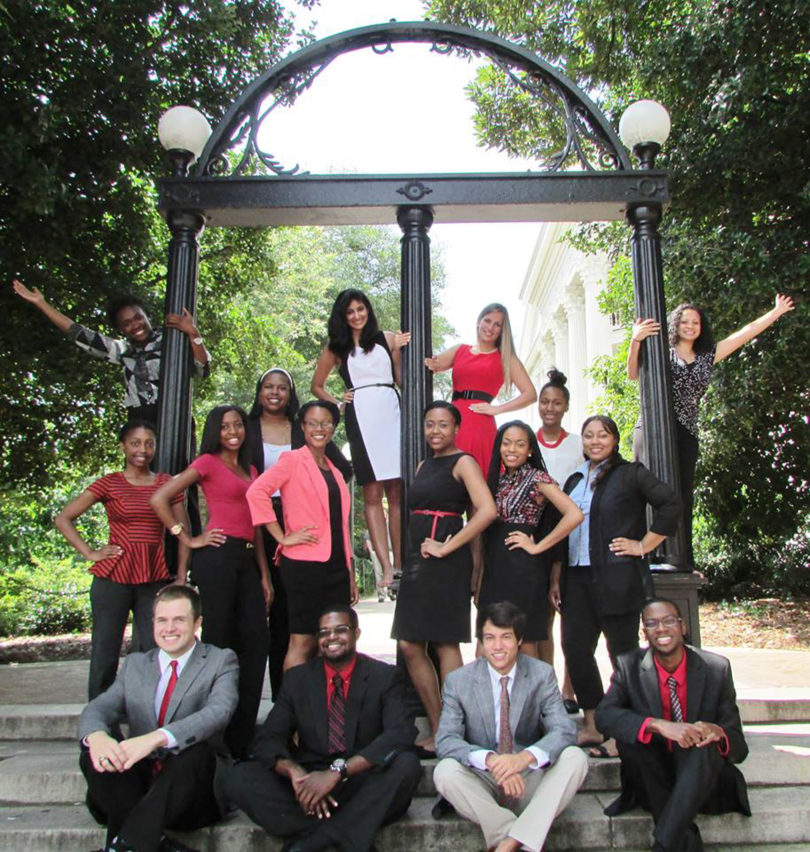Athens, Ga. – In fall 2012, the Georgia College Advising Corps sent four recent graduates to high schools in disadvantaged Georgia communities to advise students on preparing for college. A year later, 12 more advisers have joined them courtesy of a $1 million grant from the Robert W. Woodruff Foundation.
The program, which was launched in 2008 and is sponsored by the University of Georgia’s Institute of Higher Education, sends recent college graduates on a two-year commitment to serve as college advisers in 17 Georgia high schools.
“Increasing the proportion of Georgians who attend and complete college is vital to the prosperity of this state,” said Libby V. Morris, interim senior vice president for academic affairs and provost. “The support of our donors, the dedication of our advisers and the determination of the students they serve is helping us realize that goal.”
In Georgia, the average ratio of high school students to guidance counselors is more than 400 students for every counselor. In some low-income areas, the student-to-counselor ratio is even higher. The American School Counselor Association recommends one counselor for every 250 students, and the advising corps can help achieve that benchmark, according to Yarbrah Peeples, program director for the Georgia College Advising Corps.
Whereas a guidance counselor is trained to deal with the mental and emotional health of students, the advisers are trained to deal exclusively with preparing students for college. This can include anything from helping them register for the SAT and ACT to finding scholarships and advising them on what colleges look for in an application essay. Their work also frees up time for guidance counselors to focus on the mental and emotional well-being of their students.
GCAC advisers have found that it’s not always a lack of effort in school that keeps students from going to college. Often, it’s a lack of information and guidance on how to prepare and apply for college.
“A lot of times people think that kids don’t want to go to college. I’ve found that a lot of students just don’t know anything about it,” said adviser Lawrence Harris, just minutes after leaving a college fair he helped arrange that saw seven Clarke Central students get accepted to college on the spot.
According to GCAC data, students who have met with an adviser are 25 percent more likely to apply to college, 34 percent more likely to be accepted to four-year colleges and universities and 45 percent more likely to engage in college-going test preparation.
GCAC advisers, most of whom are UGA graduates, served more than 6,000 students last academic year. Advisers also led more than 400 students on college tours, assisted with more than 640 college applications and helped more than 270 students register for the SAT. These are all fundamental parts of the college-going process, and these numbers were achieved by only four advisers.
Salem High School in Conyers is one of the schools included in the expansion, and first-year adviser Christopher Farr has already begun to settle into the new surroundings. Although only on the job for a few weeks, Farr, a recent political science graduate, has already met with more than 50 students and is leaning toward pursuing a career in education after his two-year commitment ends.
“As a college adviser, I see many students who don’t realize the opportunity that comes from a college education,” Farr said. “By working in education, I could see myself making an impact not only upon today’s students, but also upon the students’ future families.”
Aside from the obvious advantage of having more advisers in more schools, the expansion also has benefited the program by giving it increased exposure. “We moved into metro Atlanta, and that raises our profile,” said Peeples.
Of the 13 schools that have been added to the program, seven are Atlanta Public Schools, and the remaining six are located within 30 miles of the city.
Even in schools where the program is new, advisers are finding that a little bit of guidance can go a long way.
“It’s not us helping them. It’s just us directing them to find the information,” Farr said. “When you show them all the opportunities that are there for them, it’s really unbelievable.”
Students who have been through the program serve as reminders of those opportunities.
“During my senior year at Thomson High School, my GCAC adviser, Mr. (LaShon) Leggett, helped me tremendously,” said Calvin Hill, a student at Georgia State University. “If it wasn’t for him, I wouldn’t have received any of the scholarships that I received or scored very high on my ACT.”
“GCAC has helped me as both a high school student and now as a freshman in college,” said Anna Kitchens, a student at Emmanuel College in Boston and a former student at Thomson High School. “Mr. Leggett opened doors for me while I was applying for colleges and financial aid that I honestly would not have known about otherwise.”
Advisers are placed in Benjamin E. Mays High School, Coretta Scott King Young Women’s Leadership Academy/BEST Academy High Schools, DM Therrell Health Science and Research High School, Henry W. Grady High School, North Atlanta High School, South Atlanta High School of Computer Animation and Design, Clarke Central High School, Towers High School, Ronald E. McNair High School, Benjamin Banneker High School, Tri-Cities High School, Meadowcreek High School, Thomson High School, Westside High School, Rockdale County High School and Salem High School.
Additional supporters of GCAC include the Watson-Brown Foundation, AmeriCorps, AT&T, Bank of America and the John and Mary Franklin Foundation.
For additional information, see http://ihe.uga.edu/programs/georgia-college-advising-corps.





